10:32
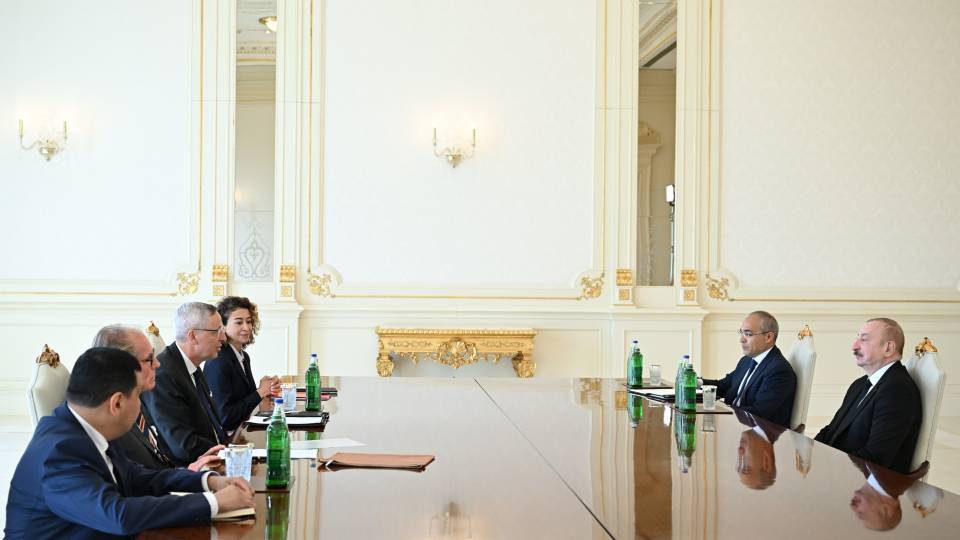
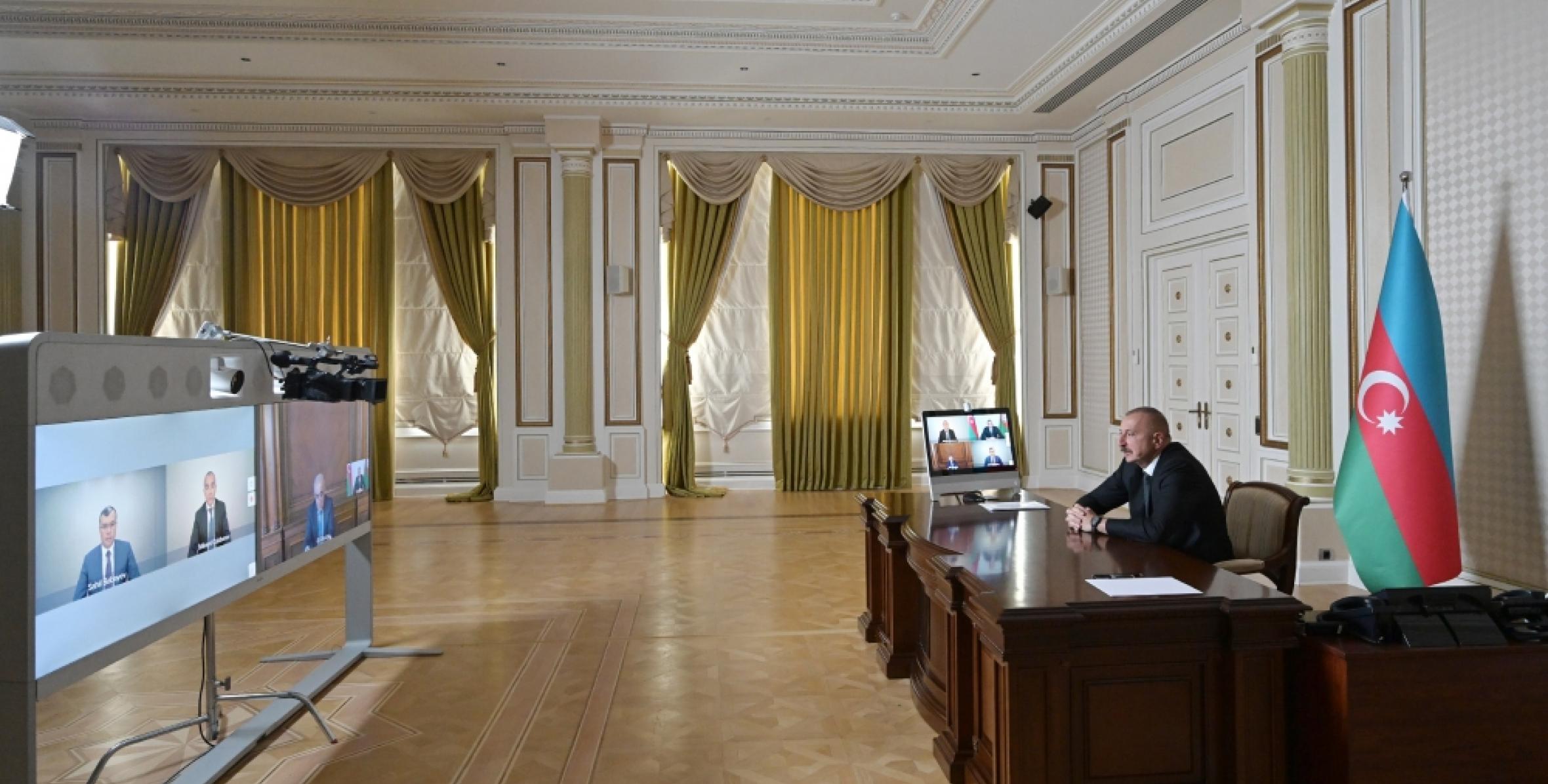
President of the Republic of Azerbaijan Ilham Aliyev chaired a meeting in a video format on measures taken to combat the coronavirus pandemic and the socio-economic situation in the country. The head of state made an opening speech at the meeting.
Opening remarks of President of the Republic of Azerbaijan Ilham Aliyev
- There is a positive dynamic in the fight against coronavirus. The positive trend observed as of 16 July allows us to say that all the measures have been undertaken in a timely manner. Thanks to these measures, the situation remains under control to this day. Since 16 July, the number of new cases of infection is far lower than the number of people recovering from the disease. This positive trend suggests that we will continue to keep the coronavirus disease under control. We are very pleased with the positive dynamic in the fight against coronavirus in the past three weeks. In principle, from the very first days, immediately after the outbreak of this disease, all preventive measures were taken. Thanks to that we are recovering with minimum losses.
Certainly, all organizational issues had to be addressed properly and we have achieved just that. In a short time, we managed to bring our hospital availability in line with the situation pertaining to the disease. The merit of our doctors is immense and owing to their tireless activity the mortality rate from this disease in Azerbaijan has remained at a minimum. As you know, 46 hospitals are there to serve only coronavirus patients today. I must also say that 41 of these 46 hospitals were built or overhauled and provided with state-of-the-art equipment in the past 17 years. Had we not taken these steps on time, we would be faced with great problems and a dire situation today.
I believe we are taking successful steps in connection with the tests. Azerbaijan has held a leading position in the world in terms of the number of tests per capita. Of course, testing requires the presence of opportunities. We have multiplied the number of our laboratories by five times in a short span of time. The new laboratories to be acquired shortly will enable even more tests. We must increase the total number of laboratories to 45. New ambulance vans have recently been delivered to the country. There are plans to deliver a total of 100 ambulance vans, and 40 of them are already in Baku. These vehicles are and will be sent to all the regions. These vehicles are certainly of great importance in providing the necessary medical and emergency care to our citizens.
In the meantime, because the number of patients was on the rise, there was still a need for the construction of new hospitals, even though the existing hospitals had significantly boosted our capabilities. For this purpose, the construction of modular hospitals was organized. Nine modular hospitals have been commissioned to date. Four of them started operating in one day – on 29 July. These hospitals were opened with my participation in Gobustan, Ismayilli, Gabala and Shaki. Soon, the total number of modular hospitals will reach 16, thus a total of 3,200 coronavirus patients will be treated in these hospitals alone. An 800-bed hospital was commissioned through the Ministry of Emergency Situations and another 1,300-bed hospital will be commissioned before the end of this month. This will provide additional 2,100 beds. At the same time, two Olympic Sports Centers have been turned into hospitals in a short time. About 300 patients can be treated in each of these centers if necessary. There is no need for that right now, but if it arises, we will certainly be able to use these capacities as well.
When we talk about preventive measures, all of these factors are taken into account, of course, because we must be ready for the most critical scenario. It is thanks to such swift and goal-oriented steps that the disease is now under control. I want to say again that the number of patients has been decreasing for the last three weeks. All of these steps, of course, allow us the opportunity to recover from this situation with dignity and protect our people’s lives.
We were faced with natural difficulties associated with the need to increase the number of doctors. Therefore, the possibility of inviting them from abroad was looked into. Doctors have now been invited from several countries and they are already treating patients in Azerbaijan. Teams of doctors from Turkey, Russia, Cuba, Italy and China have come to Azerbaijan and have already started working. Of course, this creates additional opportunities for us because the healthcare system in these countries is developed and there is a lot of experience there. At the same time, of course, issues of treating patients and exchanging experiences are resolved here in a complex.
All necessary measures will continue to be taken to protect people’s health. I want to say again – I have repeatedly said this and our position is known to the Azerbaijani people – the primary issue for us is the life and health of our people.
As far as economic and social issues are concerned, they are also being addressed. Suffice it to look at the work that has implemented in recent months to see the amount of work that has been done. The extensive social package we have introduced covers nearly five million people. The vast majority of the 900,000 public sector employees have, in fact, stayed at home, their salaries have been paid by the government. A total of 760,000 people were provided with the necessary financial support and their jobs were preserved. Otherwise, 760,000 people could have lost their jobs because the sectors in which these people are employed have been worst affected by the pandemic. Of course, entrepreneurs and employers are no longer making money and hundreds of thousands of people could have lost their jobs. As a result of prompt measures taken, the government immediately intervened in this matter again. Indeed, significant financial resources have been spent on all this.
A total of 600,000 unemployed people, including those working unofficially, those who temporarily lost their jobs and other vulnerable categories of the population, are provided with government care. They have been receiving 190 manats as an allowance for several months now. I believe that this social support should be continued. A strict quarantine regime is in place in 13 cities and districts of Azerbaijan now. People of this category living in these districts should continue to be provided with this support. I am instructing you to pay them 190 manats in August as well.
This is only a part of the work done if we take into account the fact that large social projects are being implemented in our country. Their volume reached a record high in 2020. Even though the pandemic and the decline in the oil price had a very negative impact on our revenues, none of the envisaged social projects remained unfinished and reduced. I must note that a record number of IDP families will be provided with houses and apartments this year. More than 7,000 families of displaced persons will take advantage of this opportunity this year. A record number of 1,500 families of martyrs and those disabled in the Karabakh war will be provided with apartments this year. More than 400 servicemen with an impeccable service record in the army will be provided with free apartments by the government. In other words, overall, the government will provide apartments for at least 9,000 families this year. All these apartments are of high quality. Almost all of them are in newly constructed buildings. So if one family has an average of five people, this means that 45,000 people in our country are provided with free, quality housing by the government. I can say with full confidence that this is the highest achievement in the world in per capita terms.
This demonstrates our intentions and our policies. It shows that citizens of Azerbaijan are at the core of our policy. All this is a reality we are creating ourselves, without receiving assistance from anyone, without seeking financial support from any international financial institution. The vast majority of countries in the world have applied for financial assistance, but we rely on our strength. We have secured such opportunities thanks to the talent of our people and calculated policies.
I should also note that significant steps have been taken in the economic sphere and issues of business support as well. This will be reported on today. Business support programs should be continued. I believe that the projects planned at the beginning of the year, the provision of loans and subsidies to entrepreneurs on preferential terms, the stimulation of agriculture and the work done in connection with the pandemic fully reflect our policy.
We are introducing amendments to the budget. This issue is already being discussed. The Milli Majlis is already holding discussions on this issue. This shows once again that we want to support every citizen of Azerbaijan in this difficult time because when our budget was being approved, the pandemic had not started yet. Our declining revenues and increasing expenditures have necessitated a revision of the budget and adjustments to provide citizens with maximum assistance. I hope that the Milli Majlis will have its say in connection with the adjustments in the coming days. The government proposes to take the oil price at the level of $35, not $55 so that we could plan our expenses based on this indicator for the rest of the year.
This shows that the Azerbaijani state is ready for any crisis because we have created a solid foundation to be able to take the right steps in the face of any crisis. And even if the oil price remains at $35, Azerbaijan will fulfill all its social obligations and implement the necessary infrastructure projects in our country. There will also be enough to secure additional funds to strengthen the country's military potential. As for the adjustments, of course, we primarily mean social and other projects.
Today you will provide updates on this issue and the current situation in connection with coronavirus. Prime Minister Ali Asadov has the floor.
***
The head of state delivered closing remarks at the meeting.
Closing remarks by President Ilham Aliyev
- I want to say again that the overall work done in connection with the pandemic deserves a high acknowledgment. However, we should not be complacent with the results achieved and the fact that the disease is now under control. I would like to emphasize again that the positive dynamics observed over the past three weeks shows that all the steps were taken in the right direction. The key objective of the quarantine regime is to protect our people from this disease, protect their lives, protect their health and thus get out of this situation with small losses. So far, we have been able to achieve this. I believe that the main reason why the disease did not gain momentum is the fact that we have taken the right steps.
The positive dynamic now leads to a relaxation of the quarantine regime. But there must be a very strict control mechanism in place as well. All sanitary-epidemiological requirements in the reopening facilities must be fully complied with. Social distancing must be maintained. Services provided at the facilities must be organized under the new rules. The most important question is who should be responsible for exercising these controls. You need to submit solid suggestions on this matter – whether it must be a certain government body or several bodies exercising control over this issue. I think electronic capabilities should be used as well. Many facilities are now equipped with cameras. These cameras need to be connected to our shared surveillance system to provide online video surveillance. Because if a person comes to a facility as an inspector and intends to exercise control over something, it can be either effective or as we know such control may sometimes lead to very unpleasant situations. There may be a certain arrangement, an interest. Therefore, in the current circumstances, we need to pay more attention to digitalization in general. We must integrate the services provided by both the public and private sectors into this common system. I think that this issue should be taken very seriously and online video surveillance systems should be introduced. Relevant government agencies should be able to conduct such video surveillance. If they see that entrepreneurs are in breach of these rules, they should be punished. This is unequivocal.
The easing of restrictions has led to a resurgence of the disease in many countries. There is plenty of information about this in the media. Almost all the countries that have gone for a softening of the restrictions and opened their tourism, catering and service facilities are faced with a resurgence of the disease, and this is called a second wave. However, the vast majority of doctors view this as a consequence of failure to comply with sanitary norms. I also agree with this approach because this disease has not vanished. This is why the disease is still being fought. No one can claim that a certain country has beaten this disease. The second wave may occur if the disease disappears and then a new source of the infection reappears. Therefore, there must be very rigorous control over this issue and you must organize it.
Social support will continue to be provided. I want to say again that our main goal in connection with this disease is to protect people’s health. Of equal importance is people’s social welfare and we are providing that also. Next in terms of significance come our economic situation, economic development, economic sustainability, and support for businesses and preparation for a post-pandemic period. However, no one can say when the post-pandemic period will begin. In general, I think that no one can venture to make any predictions now but we must be prepared for that anyway. The newly established businesses should, taking into account the government support, already plan their future in such a way that the country's overall economy can recover more quickly.
I want to emphasize again that we have losses in this area. But these losses could have been much bigger. Our economy shrank by only 2.7 percent in the first six months. The falling oil prices have also played their part. At the same time, the commitments we have taken under the OPEC+ deal have also played a role because we have reduced production. Some developed countries are now experiencing an economic downturn of 10 percent, 14 percent, 20 percent and more. Of course, when we look at these countries, our situation is better. However, our economic development must be secured nonetheless. I believe that the work to be done by the end of this year, especially the work to be carried out in the area of entrepreneurship, as well as the steps to be taken in the direction of management of state-owned companies, should contribute to this economic recovery and reduce losses. The losses of state-owned companies are quite large. Look at our gas losses – indeed, they have recently decreased, but they are still unbearable. Look at our water losses. I have held a special meeting to address water issues. An Action Plan has been adopted and is already being implemented. The losses are at the level of 40-50 percent. Of course, we are also worried about the losses in the power grid. Even though major funds have recently been invested in this area and modern infrastructure has been created, there are still losses. If there are losses in the private sector, a private entity goes bankrupt, closes its business and no one comes to its rescue. But state-owned companies have grown accustomed to the fact that all their shortcomings and losses will be reimbursed by the state. Even gasification is financed from the state budget in our country. However, this is a direct responsibility of the State Oil Company. This year, we have envisaged 100 million manats in the state budget for the gasification of villages. Okay, if the state does all this, then what is the State Oil Company doing? After all, this is its job and its duty.
The situation in all other state-owned companies is similar, worse, or slightly better than this. But the fact is that if state-owned companies do not operate based on normal corporate governance, we will always be facing these problems. This will no longer be tolerated. I think that the funds allocated to state-owned companies do not correspond with their performance efficiency. With so much money allocated better results should have been achieved. However, this is not the case. First of all, because they are fully confident that the state will always take care of all their problems, will take on responsibility for the loans they have taken and failed to repay, will give them subsidies, and so they have become complacent.
At the same time, losses are tolerated. In some cases, unnecessary projects are implemented or their implementation is launched. These projects have to be completed but it turns out afterward that they are ineffective. Contributing to this, of course, are violations in governance and some cases of personal interests. I have said this before but I want to say it again that in the run-up to state budget formation, at the stage of discussions, requests are received from all state companies – give us so much here and so much there. Of course, we will continue allocating funds for social infrastructure projects. However, we need to see whether a partnership between the state and the private sector is possible here, as it is the case in developed countries. But when the state budget is discussed, state companies send in their requests concerning major projects – give us this much to do this. But no one ever reviews the efficiency of this work – whether or not this work should have been done in the first place. Should this work be done this year or it can wait for two years? No one looks at that. Control is at a low level. Therefore, it is necessary to pay attention to this issue.
I want to say again that our highest priority is people's health, their social status and our economic sustainability because, in the absence of economic sustainability, we will not be able to fulfill the first two tasks. If we do not have strong economic opportunities, all our intentions will remain on paper. But we want to do all this in such a way that the country would develop and the country’s future would be secured through the development of the non-oil sector. Of course, it is gratifying that the macroeconomic situation remains stable, that inflation is at around 3 percent and, as it has already been reported here, our foreign debt has not increased. It may have increased in relation to the gross domestic product though because our gross domestic product is declining and will continue to decline. In absolute terms, however, our foreign debt has not increased and I think it should decrease by the end of the year.
Support for entrepreneurship will continue in an even more transparent and organized manner. The projects submitted by entrepreneurs should take into account the real market – both domestic and foreign. There are gaps here as well. Although the state provides entrepreneurs with preferential loans and method guidance, the submitted projects are sometimes not analyzed to the full extent. Therefore, this issue must be examined.
Unfortunately, the tourism sector completely declined this year and we are disappointed with that, of course. There were great prospects for it. As part of the mitigation of restrictions, an action plan must now be prepared to develop and promote domestic tourism. I think there are enough opportunities to do that.
I must also say that 75 percent of our taxes are generated in the private sector. If we had not carried out major reforms in the tax system, we would not be able to collect and see these taxes. Thanks to the reforms in this area, we were able to raise additional funds in six months. But, of course, this cannot continue until the end of the year because foreign trade has significantly declined and many trading facilities are closed. However, this figure is both gratifying and disturbing. It is gratifying because our private sector is already getting used to paying taxes. The concessions made to them and the time allowed to shift their accounting from the shadow to the white economy has paid off. Of course, we could have imposed sanctions from the very beginning but this could have resulted in many companies finding themselves in a difficult situation. But they were given time, explanation and advice – from now on you must work transparently, not hide your incomes and not create a shadow accounting system. You should work honestly so that you have a clear conscience and earn money honestly. There are sufficient opportunities in Azerbaijan to earn money honestly. This is why it is gratifying. What is a source of concern - what about the contribution of state-owned companies? What is the level of taxes paid by state companies? If we look at their taxes, government subsidies and direct investments, we can see that there is a huge difference. What does this demonstrate? It shows that state-owned companies are holding our country and our economy back. There can be no other explanation for this.
The State Oil Company is given money. In fact, not only for gas supply but also for drilling operations, for the financing of its share in consortia with foreign partners and the implementation of other infrastructure projects. Where does this money come from? From the state budget! In fact, these are large funds. The Caspian Shipping Company. True, the situation in the Caspian Shipping Company is better than in other state-owned companies. But what money is used to buy ships and tankers? The money from the state budget! We are building several cargo ships, the Roll-on/Roll-off ships at the shipyard now. We are doing this through the state budget and then transfer these ships to the Caspian Shipping Company. Do they operate them and then repay the money? This is a big question. How much funds are being allocated to “AzerEnergy”? True, a lot has been done, stations and substations are built, the Mingachevir thermal power plant has been practically rebuilt. But where does this money come from? Do they spend what they have earned themselves? No, this money comes from the state budget. The main source of the state budget today is the oil and gas sector.
Other companies – all AZAL aircraft have been purchased by the state. All the airports have been built through the state. But what profit does the government make? Airplanes are purchased and operated. But where is the income? When will that be paid? Are we supposed to repay the borrowed loans? The same is true for the railways. Hundreds of millions of manats are being allocated, new tracks are being laid, new carriages and locomotives are being purchased. But where is their efficiency? After all, they should operate with efficiency.
Are not we saying that this work is regulated at the proper level in developed countries? Who would ever work at a loss there? Perhaps the state provides subsidies and support for some strategic areas but in most cases, all economic relations there are based on the principles of a market economy. But it turns out that our private sector operates based on the principles of a market economy; although the state also supports it, yet the state-owned companies seem to operate according to a socialist economic model. This is unacceptable. Therefore, very serious steps must be taken in this direction.
I am instructing you: the activities of state-owned companies should be vigorously inspected and a new management system should be built. This cannot continue any longer. Such a lack of control can no longer continue.
Relevant bodies have already prepared the necessary proposals package. They have made a preliminary presentation for me. I supported this. I am instructing the government to submit the necessary documents on a new management system of state-owned companies in the coming days. I will sign them.
There is another problem – economic liberalization. We have to go for it. The recent discussions in this area give reason to suggest that serious steps must already be taken. Broad reforms are also needed in the area of privatization. We should try to evoke the interest of both local private companies and foreign ones. In some cases, companies do apply, but their applications are not considered. In some cases, the consideration of these applications is delayed. Some projects are implemented, others are not. We must be interested in those ourselves. We must provide foreign and local investors with a business plan – here is an area, here is the enterprise, go and privatize it. If a strategic investor decides to invest heavily, then the enterprise can be privatized at a symbolic price – if it gives guarantees that it will invest major funds in an enterprise. This is the only way we can launch these enterprises. We have a lot of run-down enterprises in Baku left from Soviet times. These enterprises cover large areas. New industrial enterprises can be set up on these territories – of course, subject to full compliance with environmental standards. At the same time, large-scale urban development projects can be implemented there as well. After all, the construction sector, which collapsed during the pandemic, has amassed a large potential. This will have a positive impact on job creation, the production of building materials and many other areas. There are so many dilapidated and run-down industrial enterprises in our city now! We need to attract investors. They should go and revitalize the territory, create public areas and buildings with their own money. There is a need for that and this will reinvigorate the business.
I have already said that the partnership between the state and the private sector should manifest itself through specific projects. I can say that in many cases this is still just an intention. We have both state and private companies operating in several projects. They have invested funds. But there are very few projects like that. Therefore, a new approach is definitely needed here. Perhaps the private sector will be able to work in some new areas, even in infrastructure projects. This is possible – not only with the creation of industrial enterprises but also with infrastructure projects. They only need to be stimulated. At the same time, we must involve foreign partners in this work.
Of course, the mechanism of state control over expenditures should be improved further. Government agencies should provide additional proposals and there should be public control. Members of the public should be involved in the implementation of all the projects that are of great importance to us. I mentioned this during the meeting on water supply problems. Scientists, non-governmental organizations, experts, representatives of the media – let them take part in this work as well. Let them put forward proposals as well. In other words, the broad public should be involved in this work. In that case, our work will be more comfortable and the cost control mechanism will have several tiers.
We had to do and are doing all this work anyway. Our intentions and policies have already been explicitly communicated to our citizens. I am confident that transparency, honesty, narrowing the scope of the shadow economy, improving the business environment and further steps in this direction will give us new opportunities both during the pandemic and in the post-pandemic period.
As for the fight against coronavirus, we will continue to take steps in accordance with the situation. We all understand that people are tired, that we are all tired of the quarantine. All the top officials are at work on a round-the-clock basis. After all, it is such a disaster and such a disease that there is no cure for it yet. Therefore, the only way out for us is to protect people, reduce the number of infections, prevent the spread of the disease and thus, save our citizens and our state from this situation. Therefore, steps will be taken accordingly. The quarantine regime will be relaxed whenever possible, as it has been relaxed since 05 August. However, people should also understand that if we see a sharp increase in the disease after this softening, we will be left with no other option than to tighten it again. We do not want to do that. I want this softening process to go gradually and pave the way for the next softening step. But if people see that everything is already open and do not pay attention to distancing and protective equipment requirements, then the disease will flare up again. We will then have to take tight measures again, the economy will be hit again and people will become sick again. Therefore, I am urging all Azerbaijani citizens to act responsibly. This is a very serious disease. This disease defies age – young people, physically healthy people and athletes get sick and die. This is a very serious problem for the whole world and is the world's number one scourge today. Therefore, we must all be responsible. If this is the case and if all the tasks I have mentioned are fulfilled, we will be able to ease this quarantine regime further and return to normality sooner.
I think that today's discussion has been very productive and all the tasks must be implemented appropriately. Thank you.
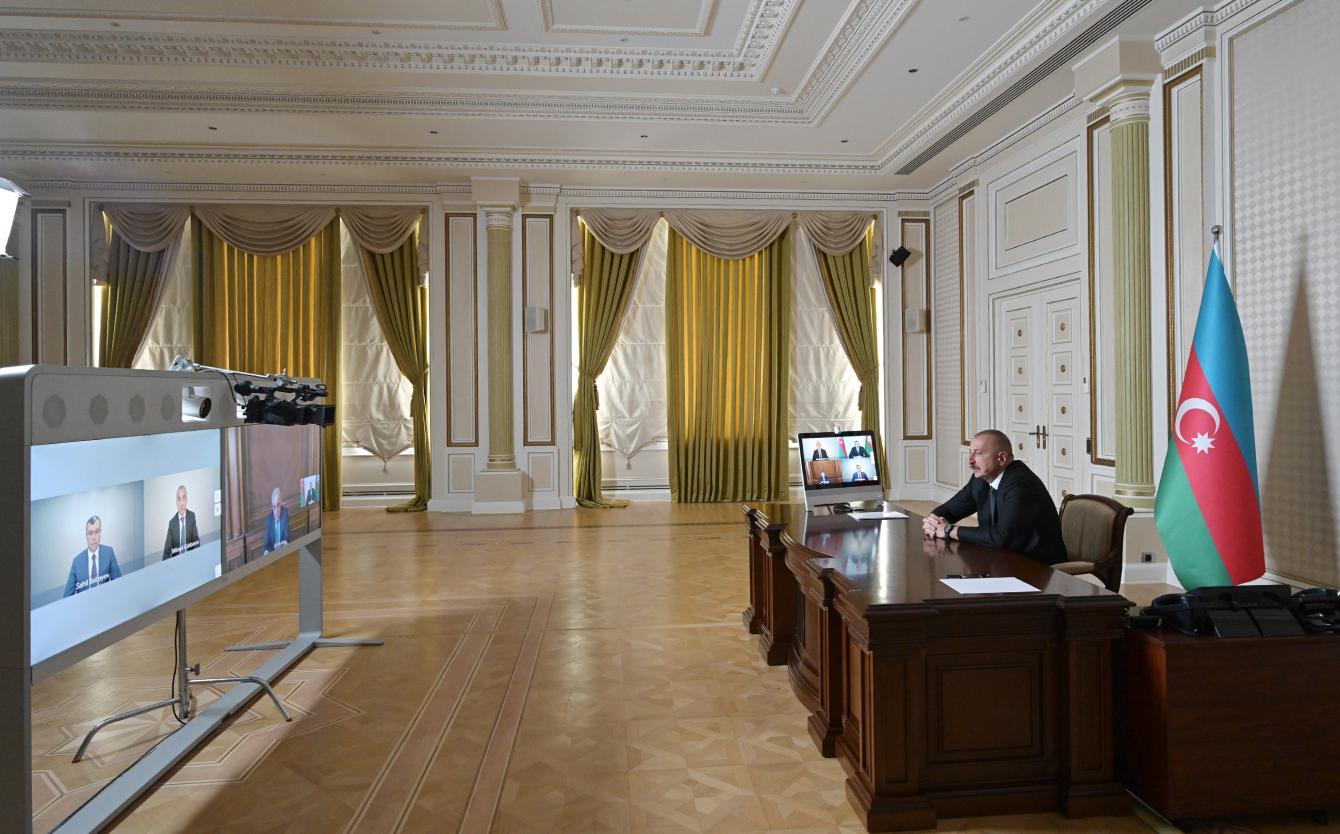
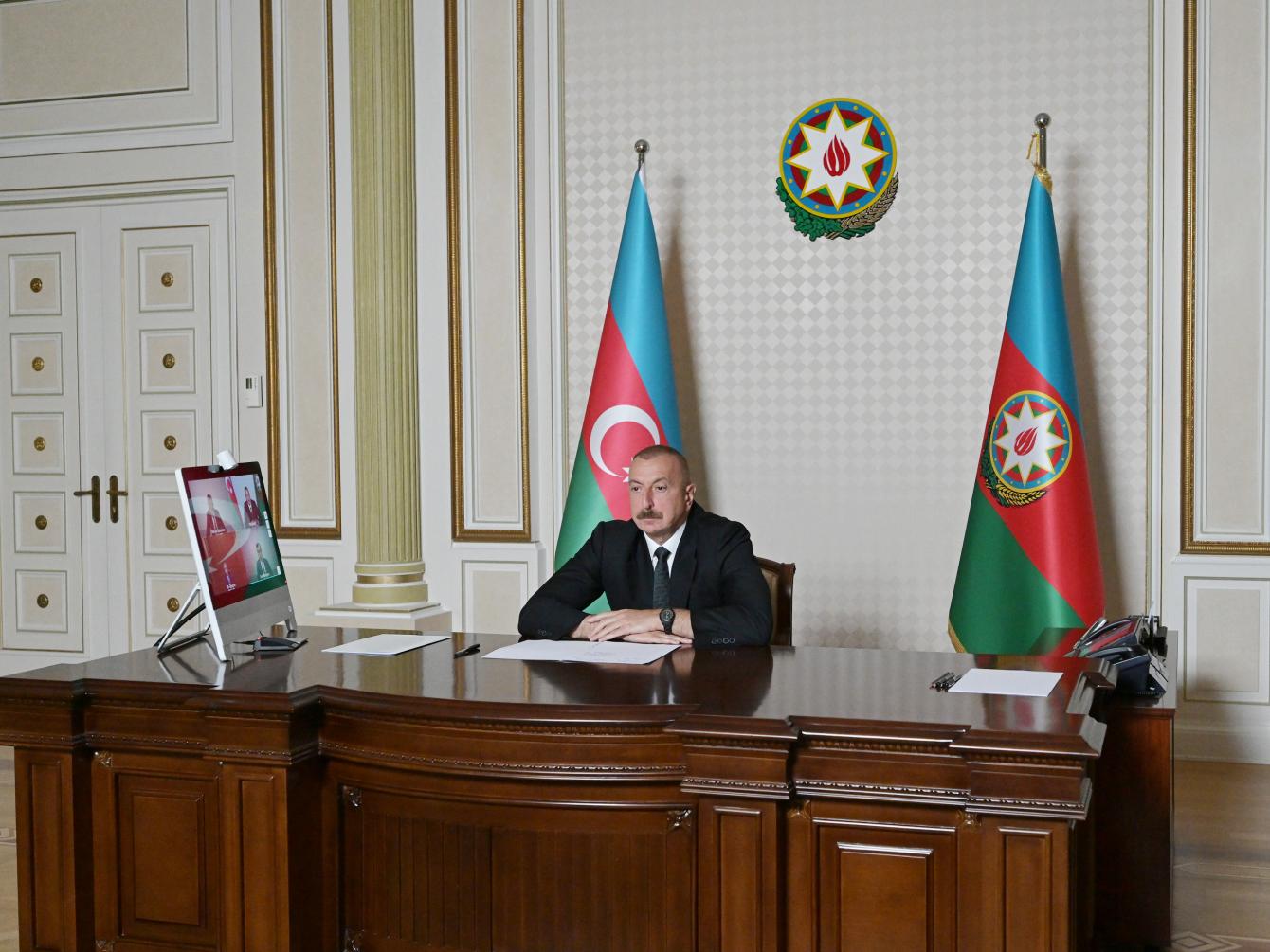
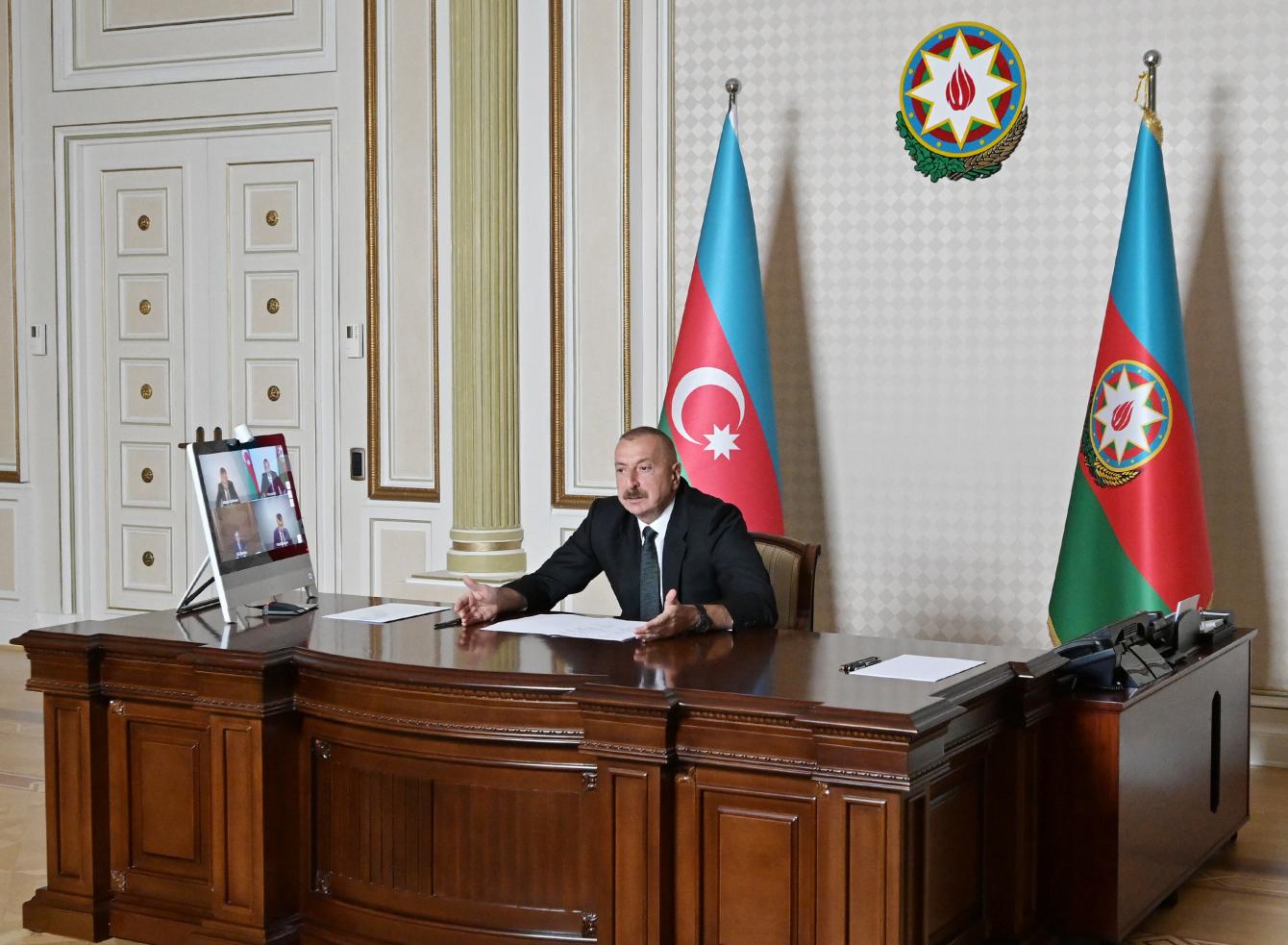
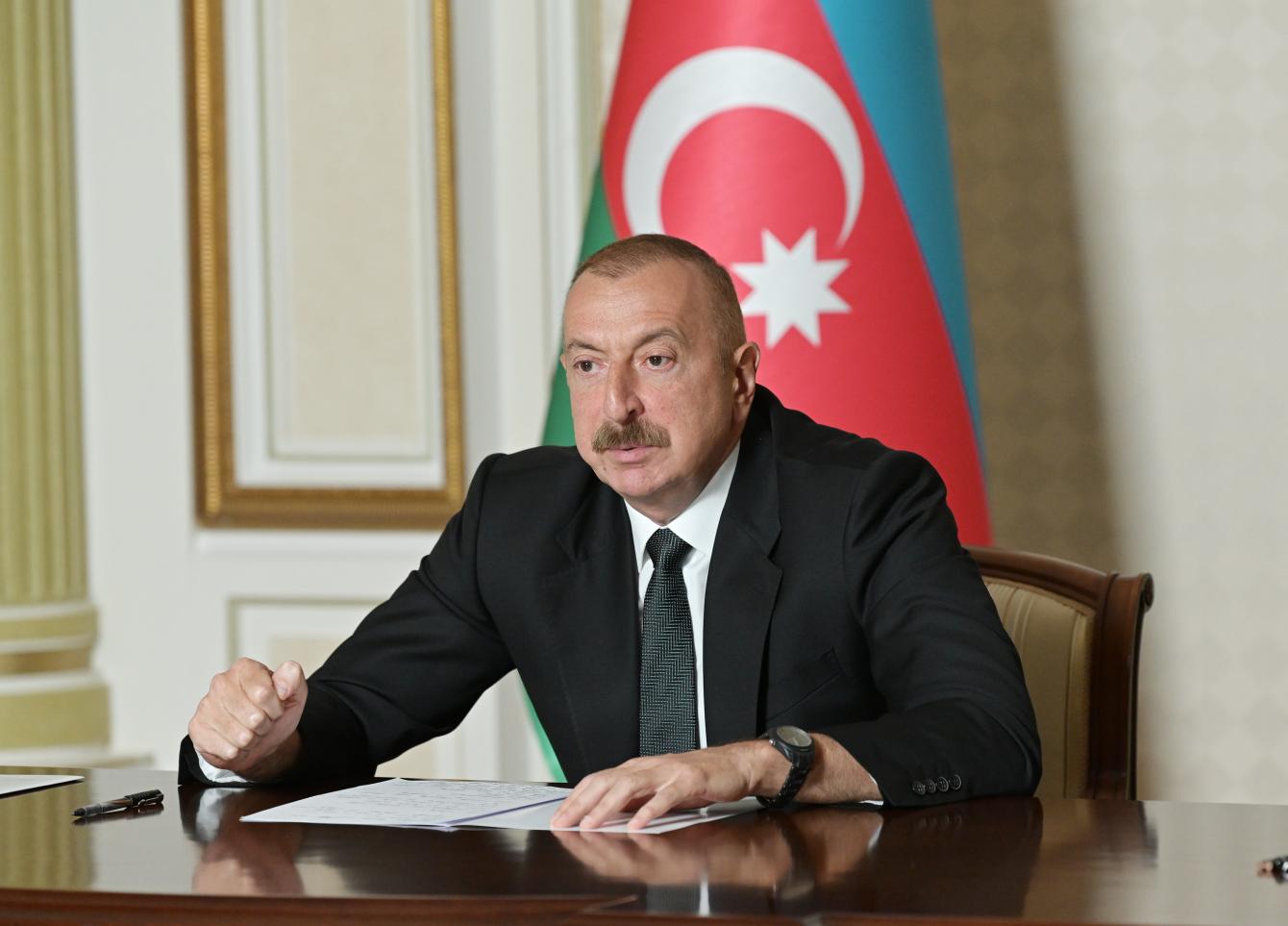
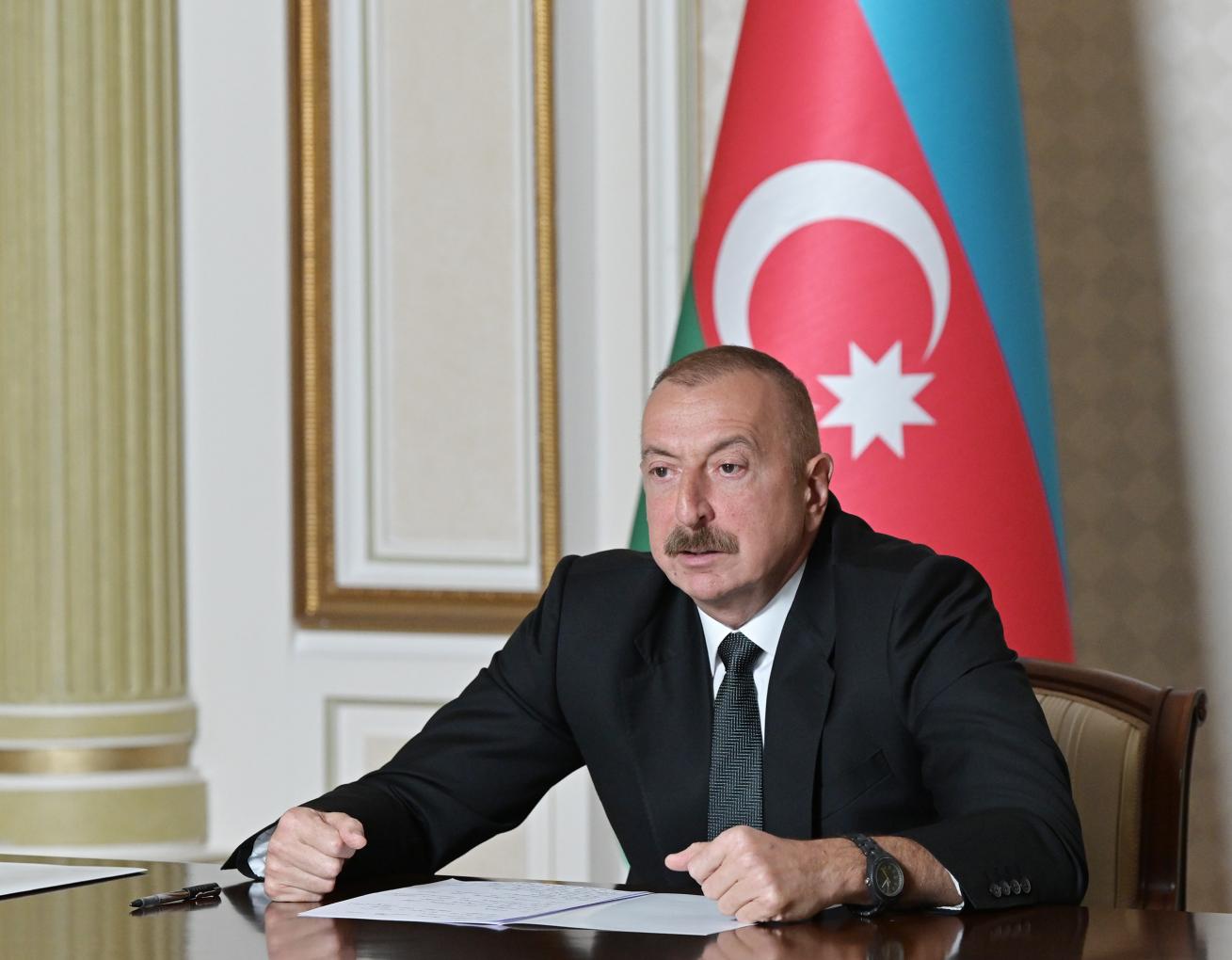
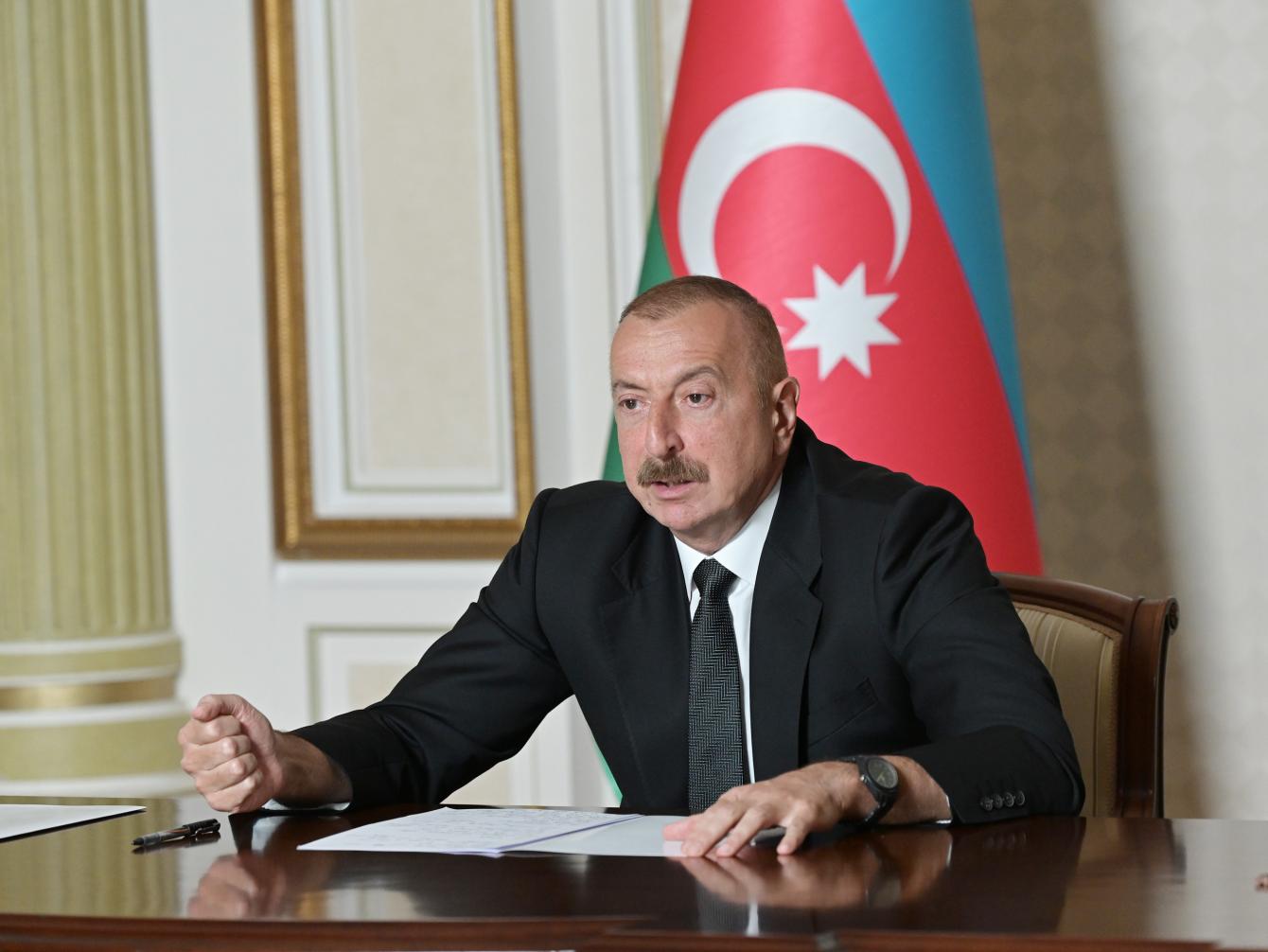

His Excellency Mr. Ilham Aliyev, President of the Republic of Azerbaijan
Your Excellency,
On the occasion of the Independence Day of the Republic of Azerbaijan, we would like to express, on behalf of the people of San Marino and in our own name, our best wishes to...
29 May 2025, 19:17His Excellency Mr. Ilham Aliyev, President of the Republic of Azerbaijan
Your Excellency,
On behalf of the people of Finland and myself, I wish to extend my sincere congratulations and best wishes to you and to the people of Azerbaijan on the occasion of the 107th...
29 May 2025, 18:00His Excellency, Mr. Ilham Aliyev, President of the Republic of Azerbaijan
Dear Ilham Heydarovich,
On behalf of the people of the Kyrgyz Republic and myself, I sincerely congratulate you and the people of the Republic of Azerbaijan on Independence Day.
It is...
29 May 2025, 17:54His Excellency Mr. Ilham Aliyev, President of the Republic of Azerbaijan
Your Excellency Mr. President,
On the occasion of the National Day of the Republic of Azerbaijan, I have the honour to extend to Your Excellency and to the people of Azerbaijan my heartfelt...
29 May 2025, 17:15His Excellency Mr. Ilham Aliyev, President of the Republic of Azerbaijan
Dear President,On the occasion of the Independence Day of the Republic of Azerbaijan, I have the honor to convey, on behalf of the Government of the Republic of Croatia and in my own name, our...
29 May 2025, 16:46His Excellency Mr. Ilham Aliyev, President of the Republic of Azerbaijan
Excellency President Ilham Aliyev,I am pleased to extend to Your Excellency my heartfelt congratulations, and best regards on the anniversary of the Independence Day of the Republic of...
29 May 2025, 15:47His Excellency Mr. Ilham Aliyev, President of the Republic of Azerbaijan
Your Excellency,
On behalf of the Lao people and on my own behalf, I would like to convey to Your Excellency and the entire people of Azerbaijan my warmest congratulations and best wishes on...
29 May 2025, 15:45His Excellency Mr. Ilham Aliyev, President of the Republic of Azerbaijan
Your Excellency,I am honored to address Your Excellency to express my most sincere and warm congratulations on the occasion of the commemoration of the Independence Day of the Republic of...
29 May 2025, 15:26His Excellency Mr. Ilham Aliyev, President of the Republic of Azerbaijan
We are pleased to extend our sincere felicitations to Your Excellency on the occasion of the National Day of the Republic of Azerbaijan.
We take this opportunity to wish you happiness and good...
29 May 2025, 15:24His Excellency Mr. Ilham Aliyev, President of the Republic of Azerbaijan
As President of Ireland and on behalf of the people of Ireland may I convey to Your Excellency and the people of the Republic of Azerbaijan sincere congratulations and warmest greetings on the...
29 May 2025, 15:12His Excellency Mr. Ilham Aliyev, President of the Republic of Azerbaijan
Dear Brother President,
On behalf of the people and Government of Reconciliation and National Unity of the Republic of Nicaragua, and on our own behalf, we are pleased to express our most...
29 May 2025, 14:48